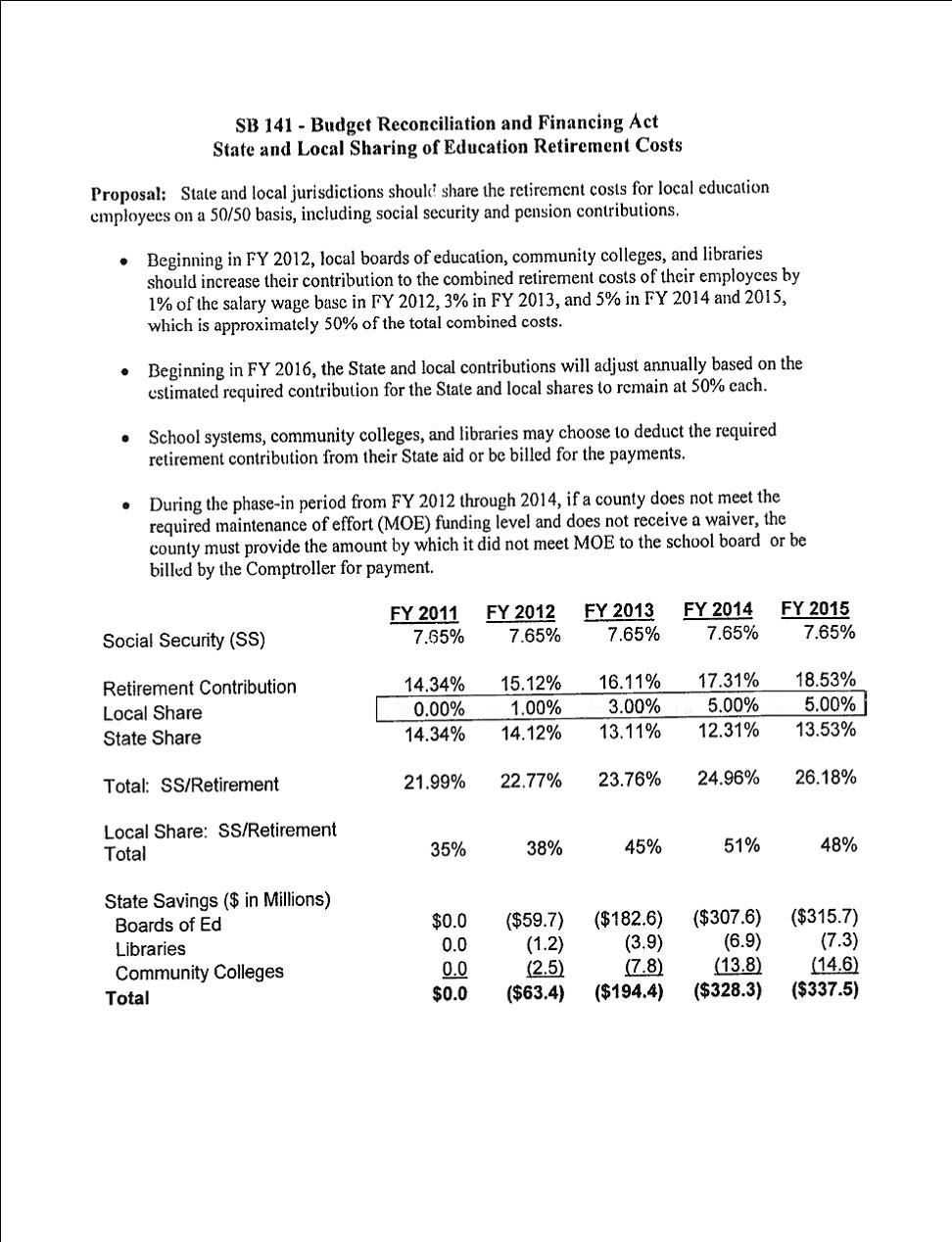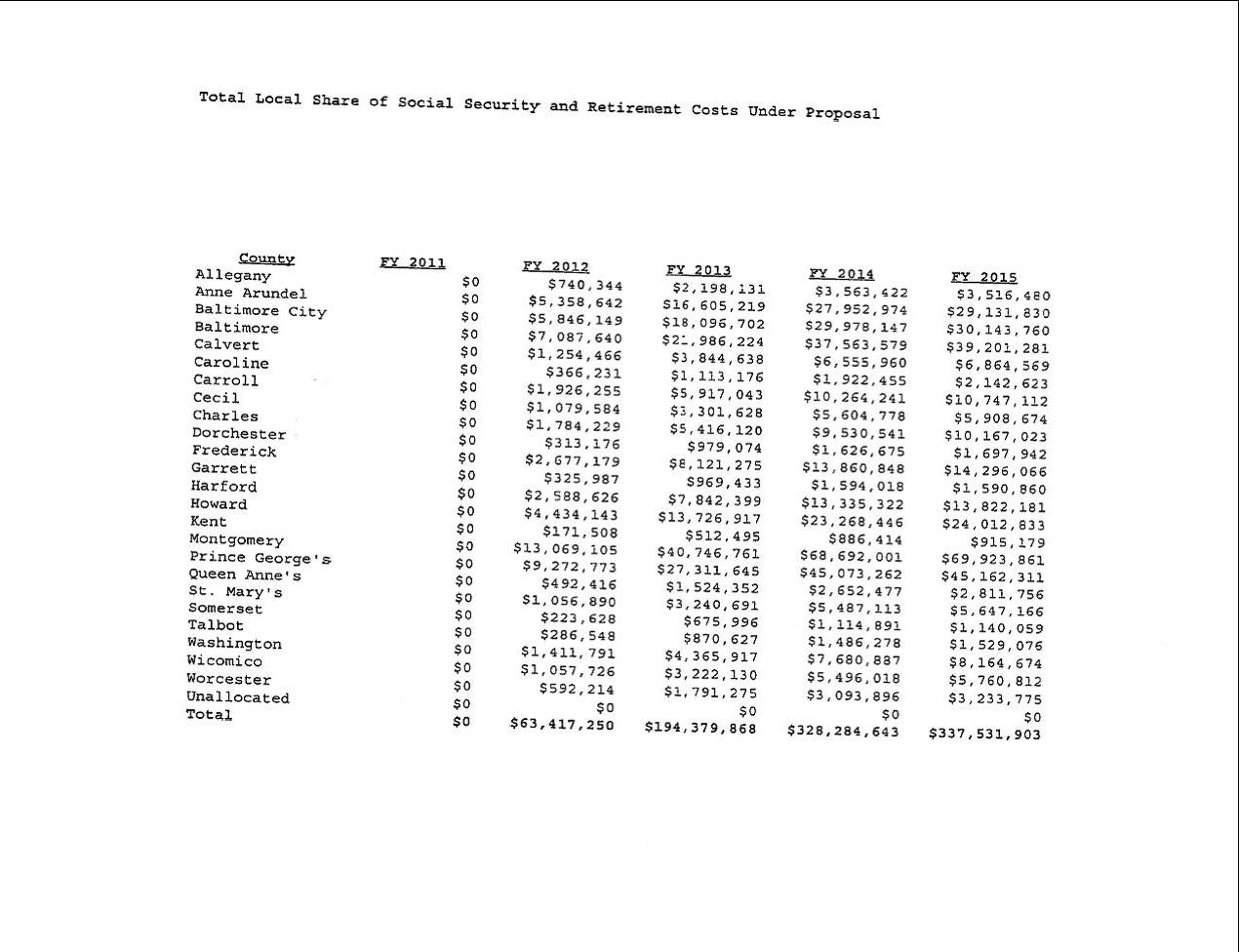Sixteen months ago, Montgomery County Executive Ike Leggett stared Senate President Mike “Big Daddy” Miller in the eye at a Committee for Montgomery Breakfast and told him, “We leave here with a mission, and that mission is we’re going to draw a line in the sand… And we’re not going to step back; we will protect our teacher pensions.” And who should cross that line in the sand but one of MoCo’s favorite sons: Senate Delegation Chairman Rich Madaleno (D-18).
Last Friday, Madaleno introduced a proposal to phase in sending part of the obligation for teacher pensions to the counties in the Senate Budget and Taxation Committee. The proposal passed by a 12-3 vote, with only Montgomery Senators Nancy King (D-39) and Rona Kramer (D-14) and Prince George’s Senator Doug Peters (D-23) voting against it. Specifically, Madaleno’s proposal would require the counties to pay 1% of teacher retirement costs in FY 2012, 3% in FY 2013, and 5% in FY 2014 and 2015. By FY 2015, the counties would be paying $337.5 million towards teacher pensions, of which $69.9 million would be paid by MoCo – easily more than anyone else. Furthermore, the payments would kick in just as federal stimulus money for education runs out. Here is the fiscal summary.


Most other MoCo policymakers had little or no warning of the proposal. That includes the vast majority of MoCo’s statehouse delegation and officials inside county government. This development surprised MANY people for the following reasons:
1. Madaleno is one of the top budget experts in the General Assembly and is Montgomery’s leader on those issues. He has stood up for the county’s interests in the past, leading a failed battle against the millionaire tax and opposing Prince George’s County’s efforts to grab more aid at MoCo’s expense. Madaleno knows better than anyone that teacher pension payment is one of the very few state aid programs that disproportionately benefits Montgomery. The county is fifth-from-the-bottom in state aid per capita overall but second-from-the-top in teacher pension payments per pupil in the state. For Montgomery, what state program besides transportation funding is more worthy of protection?
2. Perhaps more than any other county, Montgomery is in grave fiscal trouble. The county’s Chief Administrative Officer estimates the county’s future budget deficits at $519 million in FY 2012, $600 million in FY 2013, $683 million in FY 2014, $715 million in FY 2016 and $752 million in FY 2017. Why add tens of millions of dollars to those deficits?
3. Teacher pension is not only a Montgomery issue. The following counties derive a per-pupil benefit that is greater than the state average of $931 as of FY 2010 from the program:
1. Worcester: $1,134
2. Montgomery: $1,097
3. Kent: $1,050
4. Howard: $1,048
5. Somerset: $1,002
6. Baltimore City: $969
7. Prince George’s: $943
8. Allegany: $936
Despite the above benefit distribution, Howard County Senators Ed Kasemeyer (D-12) and James Robey (D-13), Baltimore City Senators Verna Jones (D-44) and Nathaniel McFadden (D-45) and Worcester/Somerset County Senator J. Lowell Stoltzfus (R-38) voted against their own constituents by supporting Madaleno’s proposal. Senate Budget and Taxation Committee Chairman and Prince George’s Senator Ulysses Currie (D-25) also voted in favor of it despite facing a possible challenge from Delegate Aisha Braveboy, who would be sure to use the issue against him if she ran.
Madaleno has enormous credibility in MoCo on budget issues, but he is taking some heat over this. One long-time admirer growled, “Rich is really off the reservation on this one.” Another observer was appalled, saying, “Wow, MoCo surrenders teacher pension without a fight.” Yet another complained about the lack of notice and said, “This is not the right way to do this.” And one influential policy maker, upon hearing of the cost to the county from the proposal, yelped, “We’re so screwed!”
Madaleno’s defenders offered theories to explain what happened while scratching their heads. One hypothesized that it was easier to negotiate with Governor O’Malley over the issue than with a possible Governor Ehrlich. Two more said that by offering a solution, Madaleno was earning MoCo a seat at the table. “If you’re not at the table, you’re on the menu,” said one veteran. Almost all our budget informants regard a partial handoff of pension obligations to the counties as inevitable. Even some of the fiercest public opponents concede – strictly off the record – that the counties are going to lose this issue. More than one believes that Madaleno’s proposal may be the best MoCo can get given the more draconian plans preferred by the likes of Big Daddy.
We will not raise the white flag until the last shot is fired. The teacher pension issue is hugely important to Montgomery County. It is not something to be given away for nothing in return because it affects our biggest long-term economic edge against our competitors in Virginia: the public schools. The Maryland Association of Boards of Education estimates that every $100,000 in pension costs passed down to the counties equals one-and-a-half to two teacher positions. MCPS is already preparing to increase average class size by one student due to existing budget problems. Montgomery cannot afford to maintain its per-pupil spending and will be applying for a state Maintenance of Effort waiver for the second straight year after never applying for a waiver in its previous history. What will happen to county schools if they bear even more budget problems? And how much more attractive will Fairfax become if MCPS suffers?
If Montgomery wants to preserve the quality of its schools, it must put up a tough fight and negotiate only when it has maximum leverage. That point is not now, but next year, when the next Governor – whoever it is – will have to pass a tax and spending package to deal with Maryland’s long-term budget deficits. Such a package cannot pass without MoCo’s votes. And that will be the time for the county to extract its terms on teacher pensions and anything else. As one of our spies says, “We are holding a handful of aces. Why fold when we can play them?”
